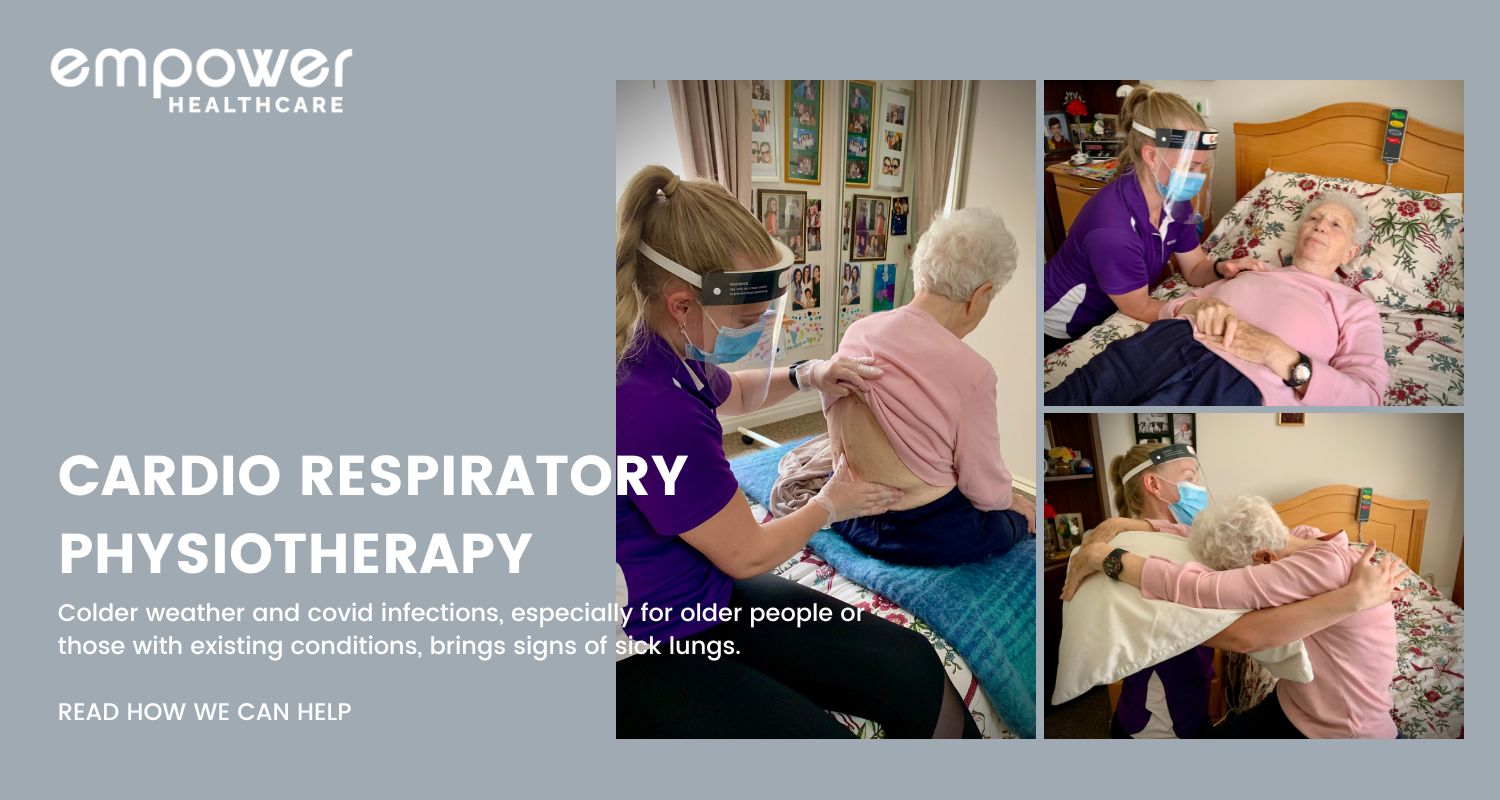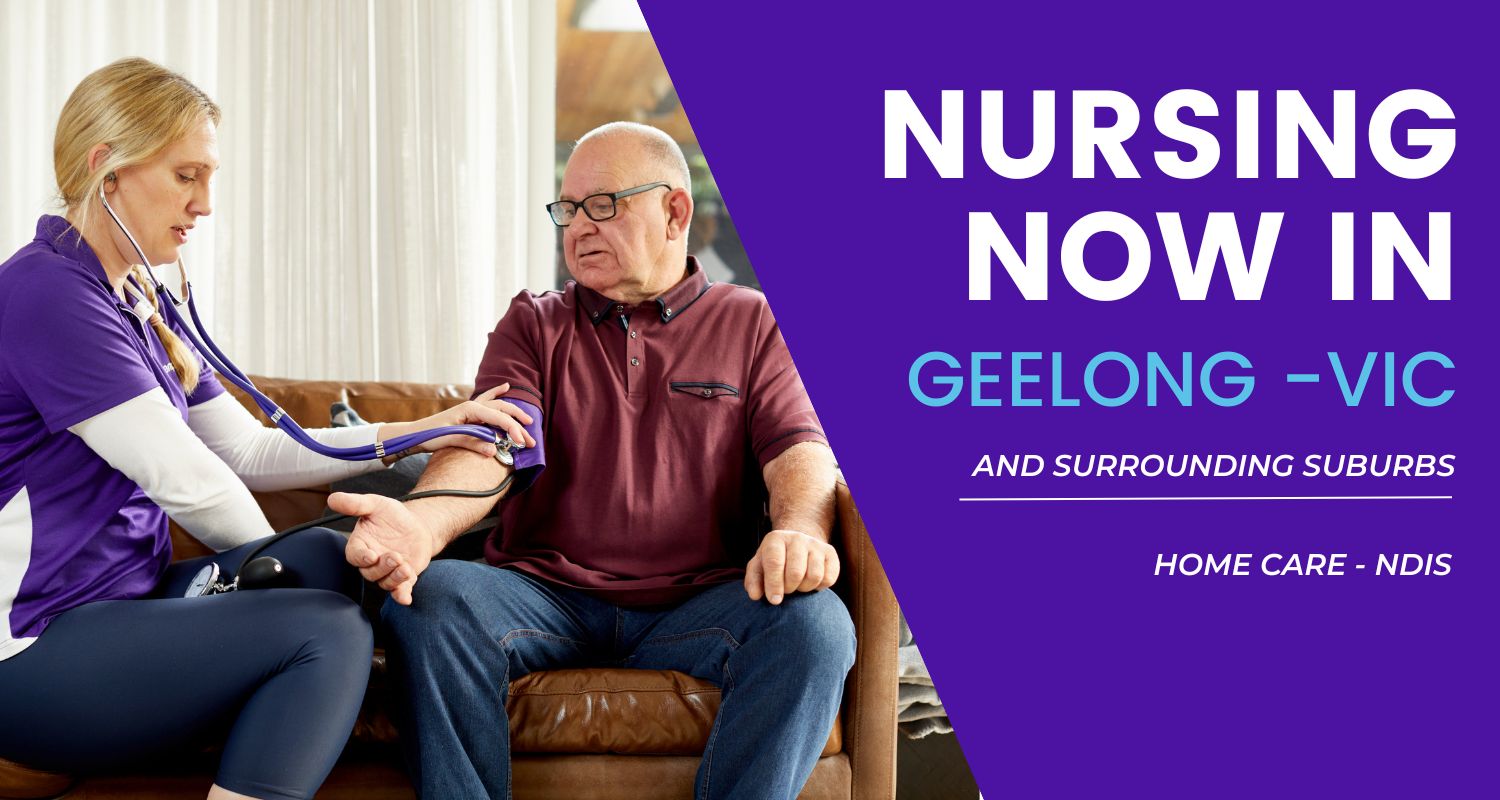Use your super skills to achieve the best possible outcomes for the people you care for.
Visit our Careers Page for more information
…
Visit our Careers Page for more information
…

Our bodies weren’t designed to live forever and death, whilst sad is inevitable for everyone. Empower clinicians are in a privileged role where they know their clients well, and can recognise changes as they near end of life.
Signs of deterioration in a client’s condition or behaviour can be a signal to start the conversation about end of life and dying. Our clinicians are trained to look for changes different to the persons norm. These conversations can be difficult and companies like PEPA help normalise the topic and remove the fear from emotionally difficult conversations.
PEPA is funded by the Australian Government Department of Health and provides palliative care education and training. Our RAC clinicians attend the program to learn how to provide high quality and effective care to people in the final phase of life.
The WHO (2017) define palliative care as
“.. an approach that improves the quality of life of individuals and their families facing the problems associated with life-limiting illnesses, through the prevention and relief of suffering by means of early identification and impeccable assessment and the treatment of pain and other problems, physical, psychological and spiritual”.
The difference between palliative care and end of life care is;
There are different decline trajectories in palliative care and having an Advance Care Plan in place for all scenarios makes discussions easier during such an emotive time. The conversations include how and where the person wants to be treated and planning for anticipatory medications. These conversations set everyone on the same agreed path – the clients, the family, and the carers whilst taking cultural requirements into consideration.
Not everyone needs specialist Palliative care, our clinicians are trained to recognise and understand the stages. Each State and Territory have their own palliative care peak body team and our team can help with those contacts.
Our Empower Values closely align the values in palliative care, and they are part of everything our team do every day to improve the comfort care of our clients through all stages of life and death.
For more information and advice speak to one of our Empower clinicians or call PCAS directly: Home Page – Palliative Care Advice Service (pcas.org.au)
Group Therapy in RAC Facilities
When to refer for Cardio Respiratory Physiotherapy
…

Simply click on the image below for our referral form.
…
I value each relationship and strive to understand every client’s individual needs, and the results they desire. A commitment to each partnership is the focus every day.
Simply click on the image below for our referral form.


On the the success of our Melbourne Nursing services growth we are pleased to say that our exceptional Nursing care is now being offered in Geelong and surrounding suburbs.
Have peace of mind knowing we have carefully selected our Nursing team to ensure that our standards will continue for you and the people you care for.
Our Nursing appointments are minimum 30 mins (where appropriate) which differ from others in the area.
To ensure we have all the information needed, every new client will have an initial assessment.
Templates to guide you on the information needed to administer the correct care.
Download the template > complete the details > forward to your doctor for further completion > attach completed authority to the Empower Referral
Our highly qualified and friendly Nursing team are looking forward to meeting the Geelong community.
Living life to the full after Ostomy surgery
Nutrition and the immune system
Simply click on the image below for our referral form.
…
There are effective and proven ways to manage the symptoms of Multiple Sclerosis, alongside pharmacological advances in the clinical management of the disease. Allied Health clinicians and nurses play an important role in helping people living with MS achieve their goals and live the best life possible at all stages of their journey.
Who can help?
Dietitians for all diet, nutrient and food related programs
Speech Pathologists for swallowing difficulties
Nurses for general medical and health assessments and management.
Who can help?
Physiotherapists work with people at all stages to create exercise programs that address the unique needs of their clients.
Allied Health assistants support with safe and effective exercise.
Osteopaths work to help clients move their bodies and reduce pain.
Podiatrists prescribe and fit shoes to improve ankle and foot stability.
Who can Help?
Occupational therapists for all home modifications and assistive technology
Physiotherapists for mobility equipment
Who can help?
Nurses can help with medication management alongside the management of any other health concerns.
Nurses can also provide continence care and catheter care for people who need it.
By connecting to the healthcare professionals that best suit their needs, people with MS can maintain the best quality of life possible. Empower multidisciplinary teams work together to link clients to the clinicians they need. Click here for more information on World MS Day.
Living life to the full after Ostomy surgery
Nutrition and the immune system
…
Why is exercising in winter so important?
Consistent activity, especially in the fresh air and sunshine, is a powerful immune boosting way to stave off winter bugs. Keeping our cardiovascular system functioning at its best means we are more able to fight off illness and recover from injuries that are a normal part of life. Lastly, exercising keeps you warmer than a blanket by raising your basal metabolic rate, warming you up from the inside and lasting long after you have stopped moving.
Tips for Enjoyable Winter Workouts
Perhaps your warm weather, early morning walk with a friend seems impossible when mornings are dark and wet or the idea of a water aerobics class or swim is less appealing when the wind is blowing. Winter may present a great opportunity to shake things up by trying a new exercise class or a different routine. Most important is that you schedule time to prioritise your health and try to have a backup plan if you need to exchange an outdoor walk for an indoor option.
Winter is the perfect time to invest in a good pair of shoes with non-slip grip and the right amount of foot and ankle support. Depending on the latitude, a good quality jacket can make even the coldest days, outside days. Whatever the climate, don’t let the weather hold you hostage. Dressing for the weather makes exercising more enjoyable all year round.
Have a variety of options, if you prefer to stay indoors on colder days, having a few exercise programs that can be done indoors will help to keep you motivated. Having inside and outdoor options will make exercising possible no matter the weather.
When the sun shines, try to get outside. Activity in the sunshine is linked to improved vitamin D levels and helps to reduce low mood linked to the winter months.
It’s never more important to take your time warming up before and cooling down after exercise than it is when it is cold. Be gentle with your body and take the time to adjust to activity and rest, as quick transitions increase the likelihood of injury.
For those of us who dislike the warm or have certain heat sensitive health conditions, winter may be the best time to reach those health and fitness goals. Remember that exercise is powerful but slow medicine and increase your activity levels slowly, by about 10% per week. Listen to your body, giving rest and recovery when you feel sore or fatigued.
Some days just don’t work out- be it a matter of the weather, a winter virus or a complete lack of motivation. That’s OK! As long as it doesn’t become a habit, its totally fine to take a break, have a rest or shake things up.
If you or someone you care for is struggling to get moving due to injury, a health condition, age or lifestyle circumstances a physiotherapy assessment may be the doorway to a healthier, stronger life. Physios can design programs and recommend exercises that take the uniqueness of the individual into account, setting realistic and rewarding goals that matter, at any time of the year.
Simply click on the image below for our referral form.
We have flexible employment arrangements to suit any life stage and attain the perfect work life balance for you. Our model of care allows for quality time with patients and clients, delivering the best outcomes for the people we see and the most rewarding work life for our therapists and clinicians.
With some of the best after tax wages worldwide and built in superannuation/pension, Australian Healthcare workers spend less time worrying about bills and more time soaking up the sun and outdoor lifestyle.
Jade, 0ccupational Therapist. Originally from England.
How long have you worked at Empower?
I started working for Empower on May 1st 2023
Relocating is a big step – why Australia and why Empower?
I always knew I wanted to move away from England, and why not move to a sunny country full of new adventures and opportunities! I landed in Australia November 2022, although I moved by myself, I was fortunate enough to have a sibling who has resided in Perth for approximately 5 years, so it was comforting to have a familiar face when I first arrived to help me get settled.
Qualifying as an Occupational Therapist (OT) in a different country I knew I would I need a supportive workplace that would allow me to learn and adapt to differences in Australian healthcare. One of the requirements of my limited registration to work as an occupational therapist in Australia was that I would need a supervisor to mentor me for 6 months which Empower was incredibly efficient and supportive with organising this.
What makes Empower the right place for you?
Empower’s core values align with my own professional and personal ethics. I wanted to make a difference wherever I worked and being part of the Empower team has allowed me to do that while living the lifestyle I had dreamed of when we decided to move to Australia.
How has Empower assisted your professional/career development?
Empower has assured me that I would have an excellent standard of training and would enable me to progress as a clinician and develop my skills over time. They understood I had trained in the UK and was still adapting to the differences in the way clinicians work here in Australia and have delivered on their ongoing help and support.
What do you love most about working at Empower?
Empower have been supportive and patient with me developing my skills and competencies since I began working for them. Although I have only been an employee of Empower for a short time I am very much looking forward to my future with the company! I have great colleagues, who have also been supportive. I have also done some multi-disciplinary shadowing to learn about the other Empower services that I will be working alongside.
What would you say to someone thinking about relocating to Australia with Empower?
It is challenging at times but everything worth doing is challenging. One day, on your break between clients you will find yourself on a bench in the sunshine, sipping a flat white, overlooking the ocean, and you will realise how lucky you are to be here. The challenge is worthwhile.
…
We have flexible employment arrangements to suit any life stage and attain the perfect work life balance for you. Our model of care allows for quality time with patients and clients, delivering the best outcomes for the people we see and the most rewarding work life for our therapists and clinicians.
With some of the best after tax wages worldwide and built in superannuation/pension, Australian Healthcare workers spend less time worrying about bills and more time soaking up the sun and outdoor lifestyle.
Eloise, Relationship Manager/ Business Development Manager. Originally from Southampton England.
How long have you worked at Empower?
I started working for Empower in Aug 2020, nearly 3 years ago.
Relocating is a big step – why Australia and why Empower?
I originally planned to come to Australia for a year and came on a working holiday Visa, I have loved it so much I have been here 6 years and am underway applying for permanent residency.
At the time in England my husband and I had good jobs but we weren’t totally happy thinking there has to be more to life than getting a mortgage in the town we grew up in. So I convinced my husband to come to Australia for a year. Needless to say he now loves it too and both of us have progressed in both our careers and life.
We have been on so many Oz adventures, Aussies joke I’ve seen more of it than they have. I love my job but I also love being able to experience new things and I hav e the best work/ life balance I have ever had.
e the best work/ life balance I have ever had.
Not to mention the wages in Aus generally for all occupations are better, even with the cost of living most people are better off financially in Australia.
Australia has miles better weather than the UK (think the longest summers of your life.)
Melbourne still gets the different seasons so you don’t have to miss out on Autumn leaves and some rain but much much less!
Everyone seems happier in the sun and Melbourne is a buzzing beautiful city, with so many breathtaking places to visit in Victoria. Australia offers a really outdoorsy lifestyle, I live a 10 minute walk from the beach and there are lots of free things to do for families including free BBQs everywhere in beautiful parks. I will also never get over how incredible the wildlife is – think colourful exotic birds flying round your house as if they were just pigeons! Or kangaroos bouncing around on your weekend trip to the country.
Empower found me, much like it seems they have found you! They were and are so supportive and despite having to wait for me, said they found the right person and were determined to wait for me to start with them. Not only that Empower have also been helping me with my permanent residency application – I don’t feel like just a number, you will be well supported at Empower.
What makes Empower the right place for you?
I wanted to work for a company I could get behind and be passionate about growing, I genuinely believe and know we change lives.
We have so many amazing clinicians that transform people’s quality of lives in the community.
Everyone in the team genuinely wants the best for clients and each other. Who wouldn’t want to work for a company making such a positive impact?
How has Empower assisted your professional/career development?
Empower took a chance on me with a wealth of Healthcare experience but no Aged care experience, I now head up both our Residential aged care Clients and our Home Care clients looking after aged care facility owners, facility managers and case managers. Empower taught me everything I know about this industry and always encourage learning through industry webinars and publications.
What do you love most about working at Empower?
I love that I am trusted and that when I suggest improvements they are actually listened too. We have a great process improvement team and so many great initiatives have been launched off the back of feedback I have personally given. I’ve worked for large corporates in the past and sometimes I would find suggestions for improvements could get lost up the corporate ladder, in a head office in a different country. People are Empowers greatest assets they know that and genuinely want to hear your ideas about how we can strive for better always.
My colleagues are amazing, and we really do have a “shared purpose” to make people’s lives better.
What would you say to someone thinking about relocating to Australia with Empower?
If before I lived here, Australia came knocking on my door when I was in the UK I would have jumped at the chance. I have made so many friends here who originated from all over the world. Both myself and my husband have grown as people, been on more adventures than we could ever have imagined and have family lined up to want to come out and visit us.
Everyone should try living in a different country at least once, Australia is a home from home from the UK and I am so excited for you! If you want someone to have your back with relocation/ settling in Empower is a brilliant company to do that with.
I have a full schedule today, so I open my iPad and read through my clients notes, referrals and other documentation via the client management system. Planning my day helps me be prepared for each client. I check that I have all the equipment and consumables needed and then I am out the door.
8am:
Luckily my first appointment takes me past my favourite café and I grab a coffee.
8.30am:
My first client likes me to be early to help her change her catheter and for medication management so that she can get on with her day. Good catheter care is essential to prevent infections and improve the quality of life for clients. We chat while I work. Getting to know my clients and talking to them is one of the favourite parts of my job. Once I’m finished, I make sure she has the supplies and advice needed until I next visit which I confirm with her and book it in.
9.30am:
My second appointment is a regular client who has slow healing wounds. I have been visiting her for some time now, and we have made some great progress. All Empower nurses undergo extensive training and professional development in wound management, so I am equipped with the latest knowledge and dressings to improve healing for my client.
11.00am:
I arrive in a Bayside suburb with time to spare so I find a car park overlooking the bay and catch up on my notes and follow up emails on my iPad before heading to my next client. On assessment, I realise he isn’t doing well and we have the difficult discussion that it may be best to head to hospital to get further investigations done. He hates going to hospital, but agrees he needs to go. This client lives alone, and doesn’t have anyone who can drive him, so I organise non-emergency patient transport. I spend the time to call his next of kin, his GP and his case manager who are all supportive of him going in. I don’t want to leave him while we wait for transport as he is anxious about going to hospital. I liaise with his Case Manager who is also supportive and organises for his normal support worker to head over and wait with him.
12.30:
Lunch time and I pop into head office to pick up some consumables and complete some CPD training at one of the desks. I catch up with colleagues and have a conversation with my manager about a client management challenge I have been having.
It’s a short drive to my next appointment who is booked for an initial assessment. This involves getting to know the client and completing a comprehensive overall nursing assessment. Sometimes new clients need referrals for allied health services or additional supports. We have a longer session than usual but I know spending the extra time is what he needs to ensure that he keeps receiving the care that ensures his quality of life and independence.
4.00pm:
I arrive home to complete all today’s documentation, send emails to my clients’ care and case managers and organise any follow up tasks.
Tomorrow I will be seeing different people with different needs – no two days are the same. I love the flexibility and variety of being an Empower Nurse. It also helps being backed by experienced nurse managers, a friendly Home Care Support Team and being equipped with all the technology, knowledge, and equipment to deliver the care needed.
Empower Nurses are on the road every day, delivering great care and outcomes.
Simply click on the image below for our referral form.
…